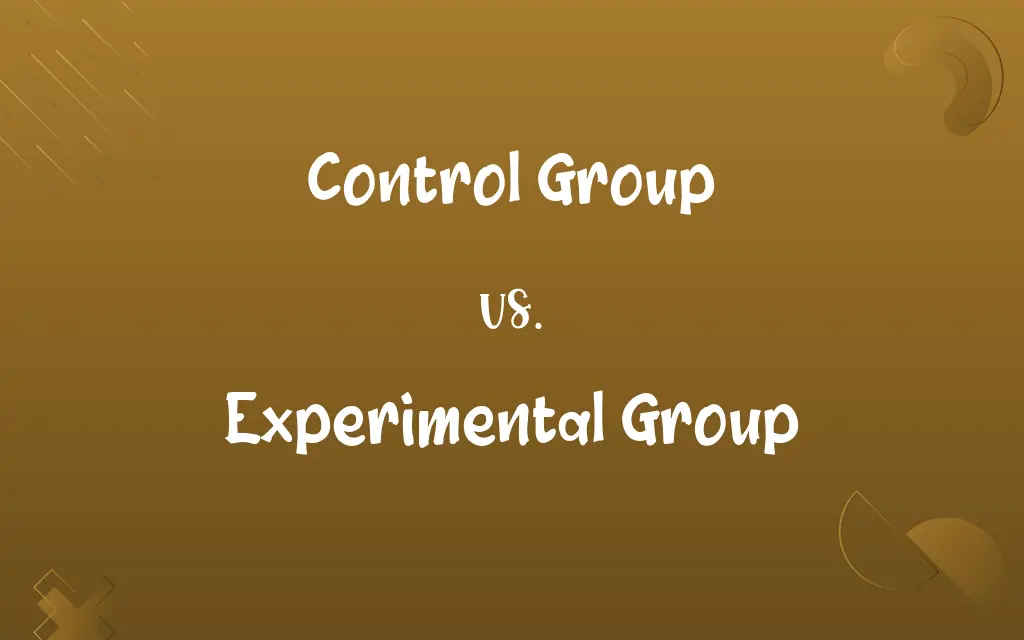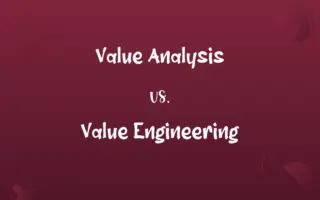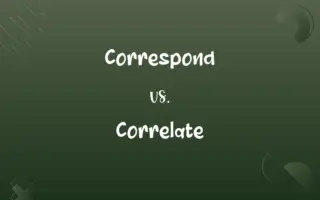Control Group vs. Experimental Group: Know the Difference

By Shumaila Saeed || Updated on December 25, 2023
Control Group is the standard for comparison in an experiment, while the Experimental Group receives the treatment or variable being tested.

Key Differences
The Control Group in an experiment serves as a baseline, not subjected to the experimental treatment, to provide a clear comparison. In contrast, the Experimental Group is exposed to the treatment or variable under study, allowing researchers to observe its effects.
Shumaila Saeed
Dec 23, 2023
In scientific studies, the Control Group remains under normal conditions or receives a placebo, ensuring no influence from the experimental variable. The Experimental Group, however, undergoes the specific changes or receives the actual treatment that the experiment aims to test.
Shumaila Saeed
Dec 23, 2023
The purpose of the Control Group is to eliminate external factors, ensuring that any changes in the Experimental Group can be attributed to the treatment alone. The Experimental Group, by experiencing the experimental conditions, showcases the actual effects of the variable in question.
Shumaila Saeed
Dec 23, 2023
Reliable conclusions depend on the comparison between the Control Group's unchanged state and the Experimental Group's reaction to the experimental variable. This comparison helps to validate the hypothesis or reveal new insights into the variable's impact.
Shumaila Saeed
Dec 23, 2023
The role of the Control Group is crucial in maintaining the integrity of the experiment, as it acts as a yardstick for normal conditions. Meanwhile, the Experimental Group is the focus of the study, being the recipient of the experimental treatment or condition.
Shumaila Saeed
Dec 23, 2023
ADVERTISEMENT
Comparison Chart
Treatment Received
No treatment or placebo
Receives the experimental treatment
Shumaila Saeed
Dec 23, 2023
Purpose
Serves as a baseline for comparison
Exposed to the variable being tested
Shumaila Saeed
Dec 23, 2023
Outcome Measurement
Used to measure normal responses
Measures the effect of the variable
Shumaila Saeed
Dec 23, 2023
Role in Experiment
Remains constant to ensure reliability
Undergoes change to test hypothesis
Shumaila Saeed
Dec 23, 2023
Impact on Results
Provides a reference point
Demonstrates the direct effects of treatment
Shumaila Saeed
Dec 23, 2023
ADVERTISEMENT
Control Group and Experimental Group Definitions
Control Group
The standard against which changes in the experimental group are measured.
The plant growth in the control group was normal, contrasting with the accelerated growth in the experimental group.
Shumaila Saeed
Dec 11, 2023
Experimental Group
The focus of a study, where changes occur due to the introduced variable.
The experimental group's reaction to the new medication was a key focus of the clinical trial.
Shumaila Saeed
Dec 11, 2023
Control Group
A non-experimental group in a study, serving to highlight the effects of the variable on the experimental group.
In the behavioral study, the control group's unchanged behavior was critical to understanding the treatment's impact.
Shumaila Saeed
Dec 11, 2023
Experimental Group
The group subjected to the experimental condition or manipulation.
In the experiment, the experimental group received additional sunlight to study its effects on plant growth.
Shumaila Saeed
Dec 11, 2023
Control Group
The group in a scientific experiment where variables remain constant to serve as a comparison.
The control group in the temperature experiment remained at room temperature, unlike the experimental group.
Shumaila Saeed
Dec 11, 2023
ADVERTISEMENT
Experimental Group
A group in an experiment that receives the treatment or variable being tested.
The experimental group showed significant improvement after the new teaching method was applied.
Shumaila Saeed
Dec 11, 2023
Control Group
A group in an experiment that does not receive the treatment, used for baseline comparison.
In the drug trial, the control group received a placebo to compare against the drug's effects.
Shumaila Saeed
Dec 11, 2023
Experimental Group
The group in a study that experiences the intervention or condition being investigated.
The experimental group, which used the new software, showed greater efficiency compared to the control group.
Shumaila Saeed
Dec 11, 2023
Control Group
A baseline group in research, not subjected to the experimental manipulation.
The control group's unchanged diet helped researchers see the effects of dietary changes in the experimental group.
Shumaila Saeed
Dec 11, 2023
Experimental Group
The group that receives the actual treatment in an experiment to test a hypothesis.
The experimental group's exposure to the experimental diet allowed researchers to observe its effects.
Shumaila Saeed
Dec 11, 2023
Repeatedly Asked Queries
What is an Experimental Group?
The group in an experiment that receives the treatment or variable being tested.
Shumaila Saeed
Dec 23, 2023
Why is a Control Group necessary?
It provides a baseline for comparison, ensuring that observed changes are due to the treatment.
Shumaila Saeed
Dec 23, 2023
Can an experiment have multiple Control Groups?
Yes, especially in complex experiments to compare different variables.
Shumaila Saeed
Dec 23, 2023
How does a Control Group enhance reliability?
By serving as a constant against which changes in the experimental group are measured.
Shumaila Saeed
Dec 23, 2023
What role does the Experimental Group play in hypothesis testing?
It's the primary focus for observing the effects of the experimental variable.
Shumaila Saeed
Dec 23, 2023
Is a Control Group always given a placebo?
Often in medical trials, but not necessarily in other types of experiments.
Shumaila Saeed
Dec 23, 2023
What is a Control Group?
A group in an experiment that doesn’t receive the experimental treatment, used as a benchmark.
Shumaila Saeed
Dec 23, 2023
What distinguishes an Experimental Group?
It undergoes the experimental conditions, allowing researchers to observe the effects of the treatment.
Shumaila Saeed
Dec 23, 2023
Can environmental factors affect the Control Group?
Yes, which is why controlling external variables is crucial.
Shumaila Saeed
Dec 23, 2023
Can there be more than one Experimental Group in a study?
Yes, to test varying degrees or types of treatment.
Shumaila Saeed
Dec 23, 2023
How are participants assigned to Control and Experimental Groups?
Usually randomly, to avoid bias and ensure validity.
Shumaila Saeed
Dec 23, 2023
Can the Control Group become the Experimental Group in a crossover study?
Yes, this is common in certain types of clinical trials.
Shumaila Saeed
Dec 23, 2023
How do researchers ensure the Control Group is effective?
By closely matching it to the experimental group in all aspects except the treatment.
Shumaila Saeed
Dec 23, 2023
What is the main goal of having both Control and Experimental Groups?
To accurately assess the effect of the variable being tested.
Shumaila Saeed
Dec 23, 2023
Is it possible for an experiment to have no Control Group?
Yes, but this can compromise the validity of the results.
Shumaila Saeed
Dec 23, 2023
What if the Experimental Group shows no difference from the Control Group?
It may indicate that the treatment has no effect.
Shumaila Saeed
Dec 23, 2023
Does the Experimental Group always receive the actual treatment?
Yes, that’s the defining feature of an experimental group.
Shumaila Saeed
Dec 23, 2023
What ensures fairness between Control and Experimental Groups?
Random assignment and maintaining similar conditions apart from the variable being tested.
Shumaila Saeed
Dec 23, 2023
What happens if the Control Group shows changes similar to the Experimental Group?
It suggests that factors other than the treatment are influencing the results.
Shumaila Saeed
Dec 23, 2023
How is the data from the Experimental Group analyzed?
By comparing it to the control group to assess the effect of the treatment.
Shumaila Saeed
Dec 23, 2023
Share this page
Link for your blog / website
HTML
Link to share via messenger
About Author
Written by
Shumaila SaeedShumaila Saeed, an expert content creator with 6 years of experience, specializes in distilling complex topics into easily digestible comparisons, shining a light on the nuances that both inform and educate readers with clarity and accuracy.






































































